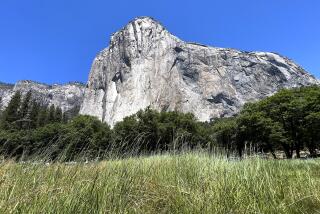One Independent Counsel Still in Business
- Share via
WASHINGTON — Long after the original target of his investigation copped a plea to a misdemeanor charge, independent counsel David Barrett remains in business.
No longer investigating former housing secretary Henry Cisneros, Barrett is focusing on whether anyone in the Clinton administration attempted to obstruct his Cisneros probe.
Barrett is the only independent counsel still in the midst of an active grand jury investigation. Other independent counsels who examined allegations against the Clinton administration--including Robert Ray, who inherited the Whitewater case, the Monica Lewinsky matter and other subjects from Kenneth Starr--have shut down their offices or set about finishing final reports.
Barrett’s mission appeared nearly complete in September 1999, when Cisneros pleaded guilty in U.S. District Court to a misdemeanor charge of lying to FBI background investigators about money he paid to a former mistress. Cisneros paid a $10,000 fine and a $25 court assessment, and won a promise that he would face no further criminal charges.
Cisneros has moved on, having started a business in San Antonio. But Barrett has remained on the case, working for the past 16 months with a grand jury at the federal courthouse in Washington. Sources said he has summoned witnesses to determine whether the Internal Revenue Service and Justice Department acted to obstruct his investigation of Cisneros, and whether they took similar action to shield other political figures from tax scrutiny.
Though Congress let the independent counsel law lapse in 1999, investigations in progress were permitted to continue. Barrett spent more than $1.1 million in the six-month period that ended Sept. 30, according to the most recent tallies compiled by the General Accounting Office. He had spent $14.6 million overall since his appointment in May 1995, the GAO reported.
Two sources familiar with the matter said Barrett had gone to the IRS and Justice Department during the Cisneros probe and asked to examine three years of his tax records, the period of time that typically is required to establish a pattern of criminal activity leading to a tax fraud case.
Barrett, the sources said, wanted to determine if Cisneros had reported all outside income. But the two agencies gave Barrett only one year of records, having determined that anything more would have exceeded his jurisdiction.
No criminal tax charges were filed against Cisneros by Barrett or the IRS.
According to the sources, Barrett grew concerned that IRS and Justice officials might have acted to protect Cisneros, perhaps in collusion with others in the Clinton administration. That triggered the ongoing investigation.
One former Justice official, who asked not to be identified, said that such an allegation is “outrageous” and that Barrett couldn’t establish a legal right to the tax records.
Cisneros is in no way a target of Barrett’s current investigation, according to the two sources familiar with the case.
The independent counsel and his staff have questioned numerous IRS and Justice officials who played roles in the dealings with Barrett, the sources said. One witness from the IRS was described by sources as a ‘whistle-blower’ who alleges wrongdoing. That witness has met about 20 times with Barrett’s staff, one source said.
Last year, two officials from the Justice Department’s criminal division met with Barrett to air their concerns that his current investigation fell outside the mandate given him by a special three-judge panel from the U.S. Court of Appeals. Barrett held his ground, sources said, and the officials took no follow-up action to challenge his authority.
Cisneros, 53, said he has been concentrating on building housing for low- and moderate-income people and has paid little attention to Barrett’s recent actions. He runs American CityVista, a San Antonio housing development company, and also is chairman of the San Antonio Hispanic Chamber of Commerce. Cisneros said he knew of no action by anyone at Justice or IRS on his behalf.
“I leave it to Mr. Barrett to do his job, and I’ll do mine,” Cisneros said.
Cisneros was indicted in December 1997 on charges of conspiracy, making false statements and obstructing justice. The allegations stemmed from statements he made to FBI investigators in 1992 and 1993, when he was under consideration to be President Clinton’s first secretary of housing and urban development. Cisneros was accused of lying about the amount of money he provided to former mistress Linda Jones, a political fund-raiser with whom he had an affair when he was mayor of San Antonio.
Barrett settled for the misdemeanor plea on the day that Cisneros was to go on trial to face 18 felony charges.
The Wall Street Journal, which first reported on the grand jury investigation last October, quoted sources as saying that Barrett earlier wanted tax records to investigate whether Cisneros failed to report income from speeches. According to the newspaper, investigators suspected Cisneros passed along those earnings to Jones.
In his guilty plea, Cisneros admitted telling an FBI agent that he had paid Jones roughly $2,500 a month after their relationship ended when, in fact, the amount was much higher. All told, prosecutors said, Cisneros gave Jones more than $250,000 from 1990 until 1994. In court, Cisneros said that he lied to protect Jones and his wife.
Jones pleaded guilty to bank fraud and other charges in a spinoff of the original probe. Clinton pardoned Cisneros and Jones in January.
More to Read
Get the L.A. Times Politics newsletter
Deeply reported insights into legislation, politics and policy from Sacramento, Washington and beyond. In your inbox twice per week.
You may occasionally receive promotional content from the Los Angeles Times.










